#reboot trek
Text
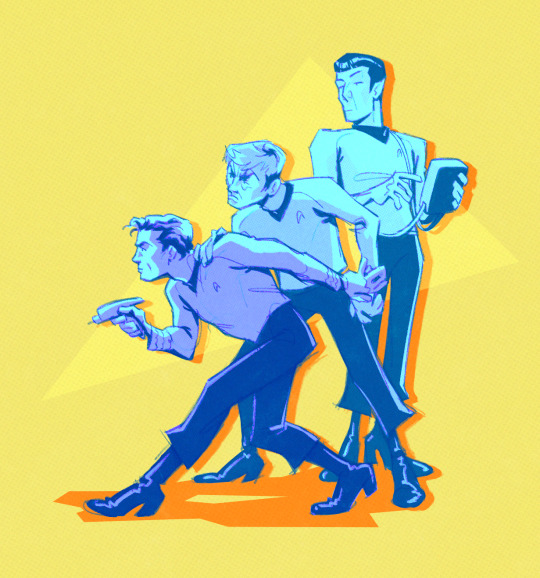
these guys am i right
#sorryhaving a tos moment rn#oops!#star trek#star trek tos#spock#captain kirk#leonard mccoy#james t kirk#jim kirk#mr spock#dont try to talk to me abt the other series i dont know shit about them#i saw the reboot movie like when it came out i dont remember anything except a handful of visuals#star trek fanart#i have like two other color variations idk maybe ill put em on my ko-fi
5K notes
·
View notes
Text

aos kirk in the green shirt 👀
#star trek#spirk#fanart#james t kirk#spock#aos kirk#aos spock#aos spirk#s'chn t'gai spock#star trek reboot#star trek aos#star trek fanart#jim kirk
2K notes
·
View notes
Text

shit james t. kirk graffitied on the side of riverside silos as a teenager
#he’s midwestern and proud of it yall#star trek#star trek tos#star trek aos#star trek into darkness#star trek 2009#star trek beyond#jim kirk#james t kirk#star trek kirk#star trek reboot#star trek memes#star trek movies#star trek the original series#americanbi’s posts
811 notes
·
View notes
Text
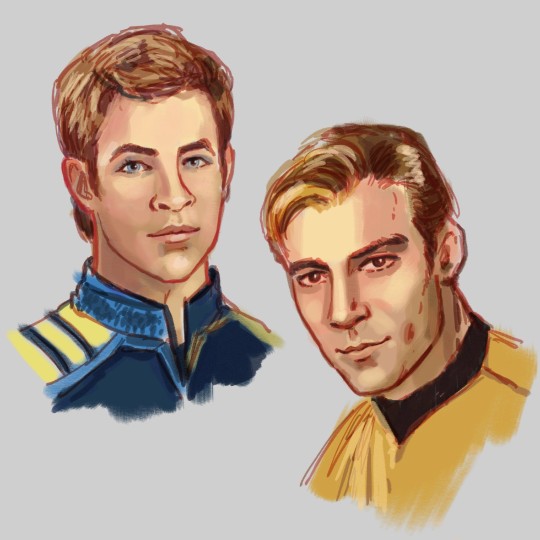
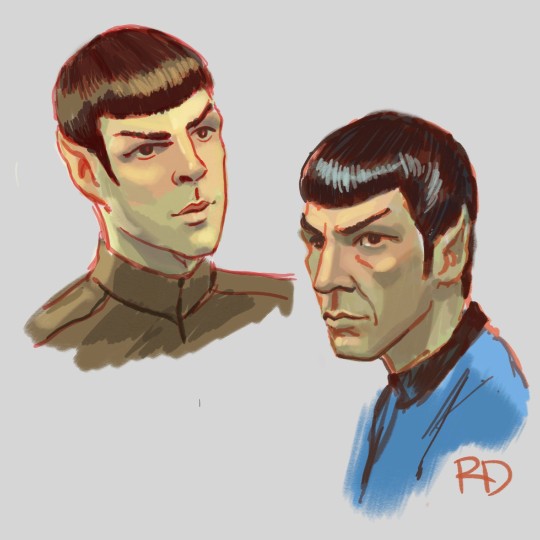

Incarnations
#star trek#star trek tos#star trek triumvirate#Star trek aos#star trek reboot#star trek fanart#star trek the original series#james t kirk#leonard bones mccoy#mr spock#Spock#dr. mccoy#leonard mccoy#Jim kirk#captain kirk#mcspirk#leonard nimoy#william shatner#deforest kelley#chris pine#Karl urban#zachary quinto
2K notes
·
View notes
Text
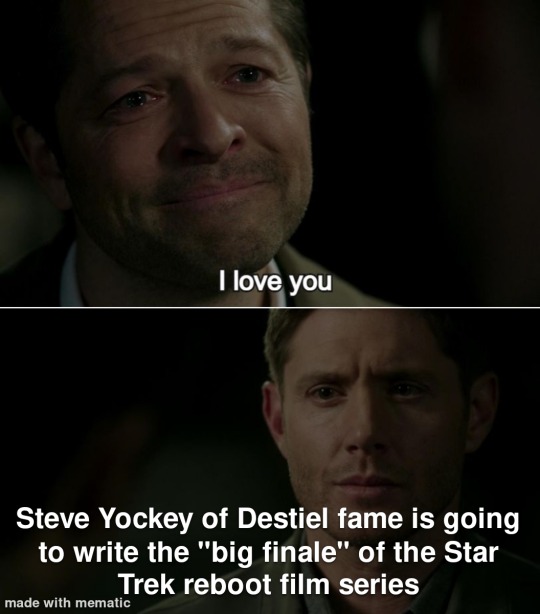
[Image ID: The Destiel confession meme edited so that Dean answers 'Steve Yockey of Destiel fame is going to write the "big finale" of the Star Trek reboot film series' to Cas' 'I love you'. /End ID]
I'm not saying Spirk but I'm also not not saying Spirk...
135 notes
·
View notes
Text





Commander Spock. The first officer at USS 'Enterprise'.
#art#artists on tumblr#digital art#illustration#fanart#portrait#digital painting#spock#spirk#zachary quinto#star trek reboot#star trek
6K notes
·
View notes
Text
Spirk is so adorable until you realize that the time that Kirk and Spock spent together is so disproportional from each other.
And I did the math to show y'all:
Assuming the Memory Alpha Wiki is correct; James T. Kirk was born in 2233 [in March apparently!] and S'chn T'gai Spock was born 3 years before in 2230 [in January, which is kinda cool].
Still assuming all wiki data is correct than they first meet in 2259, when Kirk is 26 and Spock is 29. Let's assume they assumed a friendly association with each other until Kirk took control of the Enterprise in 2265.
That means [and assuming the pair remained together until Kirk's death] the two of them shared a total of 34 years together. Kirk died at the age of 60, Spock died at the age of 161.
BUT! What's important is also the percentage of their life that had the other in it.
For Kirk it would be [if everything is correct and hypothetically K/S did start forming a friendship/relationship in 2259] approx. 57% of his life. THAT'S OVER HALF. No wonder he was so sad when Spock had died. By that point in his life he'd lived half his life with the Vulcan.
Spock, by scary contrast, spent a whopping 21% of his life with Kirk. Now, using the average human lifespan [69 years for men] that roughly equates to knowing someone for 14 years.
So basically: Kirk spent half his life with his T'hy'la whilst Spock didn't even spend the human equivalent of a decade and a half with his T'hy'la.
THAT IS SHAKESPEARIAN LEVELS OF TRAGIC.
#star trek#jim kirk#spock#star trek tos#tos star trek#tos kirk#tos spirk#star trek the original series#space husbands#those two are so cute but so sad#no wonder spock looked at alternate kirk the way he did in the reboot movies#he probably was seeing the man he loved for the first time after so long and remembering so much about his kirk#and then being sad cause his kirk is dead and this one isn't and could never compare in a realistic way#i love thinking about these space gays#it's a lovely past-time
268 notes
·
View notes
Text
Now you’re my architect.
#posting super old fanart don’t mind me#Julian Bashir#paramount lemme do the animated reboot bro#doctor bashir#ds9#star trek deep space 9#alexander siddig#animation
2K notes
·
View notes
Text
Despite its protestations of progressive values, STAR TREK media has always explicitly presented (and, with only fleeting exceptions, consistently celebrated) the Federation as an expansionist imperial power, engaged in a large-scale project of colonialism.
The usual apologia/rationalization for this, both from the franchise itself and from its fans, is that the Federation is also a post-scarcity socialist utopia. However, that is expressly not the case in TOS, despite the attempts of the later series to insist otherwise.
Indeed, the plots of some of the most famous and acclaimed episodes of TOS are specifically about resource extraction and ensuring the Federation's access to crucial resources, including lithium (in "Mudd's Women"), pergium (in "The Devil in the Dark"), and dilithium (in "Mirror, Mirror," et al). We are told repeatedly that the Enterprise has a mandate to use force to secure these resources if gentler methods fail. Moreover, while the Federation has a strategic interest in these resources, it's clear at various points in TOS that their extraction and exploitation are, to a significant extent if not exclusively, overseen by private interests for profit. For instance, in "Mudd's Women," Harry Mudd remarks:
Well, girls, lithium miners. Don't you understand? Lonely, isolated, overworked, rich lithium miners! Girls, do you still want husbands, hmm? Evie, you won't be satisfied with a mere ship's captain. I'll get you a man who can buy you a whole planet. Maggie, you're going to be a countess. Ruth, I'll make you a duchess. And I, I'll be running this starship. Captain James Kirk, the next orders you're taking will be given by Harcourt Fenton Mudd!
In "The Devil in the Dark," Kirk ultimately takes a regulatory position — he will not permit the pergium miners to kill the Horta or continue to destroy her eggs — but at no point does he suggest that stopping the pergium production that threatens the Horta is a viable or even acceptable alternative. The accord he proposes is contingent on the Horta's agreement that she and her children will support the mining efforts on her planet, since Kirk emphasizes that "a dozen planets" are depending on the miners to supply needed pergium. (What would have happened to her if she hadn't agreed is not stated, but the episode strongly suggests that she would have been severely punished for noncompliance with Kirk's mediated solution: forcibly relocated to some kind of Horta reservation away from the main mining operations, perhaps.) When the Horta does agree to this proposal, Kirk assures Vanderberg, "you people are going to be embarrassingly rich," which once again suggests that while the miners may have contractual agreements to delivery pergium to Federation worlds, they are still a private, for-profit business, not a Federation department or nationalized entity.
Profit is also Ron Tracey's motivation for breaking the Prime Directive in "The Omega Glory": He believes that he's discovered a "fountain of youth" that he can own, monopolize, and exploit, and that the value of that resource will be enough to buy his way out of legal trouble for his regulatory violations.
We mostly don't see the Enterprise crew handle money except on away missions in other cultures or times, but there are a number of indications that the Federation in this era has not abandoned money: For instance, Harry Mudd's list of past offenses includes purchasing a space vessel "with counterfeit currency," while in "The Apple," Kirk rhetorically asks if Spock knows how much Starfleet has invested in him, which Spock begins to answer, "One hundred twenty-two thousand two hundred …" before Kirk cuts him off. More tellingly, in "I, Mudd," we have the following exchange:
KIRK: All right, Harry, explain. How did you get here? We left you in custody after that affair on the Rigel mining planet.
MUDD: Yes, well, I organized a technical information service bringing modern industrial techniques to backward planets, making available certain valuable patents to struggling young civilizations throughout the galaxy.
KIRK: Did you pay royalties to the owners of those patents?
MUDD: Well, actually, Kirk, as a defender of the free enterprise system, I found myself in a rather ambiguous conflict as a matter of principle.
SPOCK: He did not pay royalties.
MUDD: Knowledge, sir, should be free to all.
KIRK: Who caught you?
MUDD: That, sir, is an outrageous assumption.
KIRK: Yes. Who caught you?
MUDD: I sold the Denebians all the rights to a Vulcan fuel synthesizer.
KIRK: And the Denebians contacted the Vulcans.
Whether Deneb is a member of the Federation at this time is unclear, but Vulcan certainly is, and so we may assume that Vulcan and presumably the Federation itself are also part of "the free enterprise system."
The first indication that the Federation does not use money is in STAR TREK IV, and it's not obvious there if Kirk's remark that "They're still using money" is talking about money more broadly or just physical currency, which the Federation may have phased out even if it still uses credit or electronic transfers of monetary value. (Certainly, McCoy's attempt in STAR TREK III to charter a starship indicates that he had some means of paying for passage, since the captain of the ship specifically demands more money upon learning of the intended destination.)
If we accept at face value the assertion of TNG and DS9 that the Federation has genuinely abandoned the use of money, rather than simply going cashless, the most reasonable Watsonian explanation is that this has been a relatively recent development during the 70–80 years between the TOS cast movies and TNG, most likely related to the development of replication technology (which the Federation did not yet have in Kirk's time).
Of course, from a Doylist standpoint, we could chalk up some of this incidental dialogue to the franchise's evolving construction of its own setting, in the same manner as anomalous references to Vulcans as "Vulcanians." Roddenberry and his apologists might also insist that he always meant to depict a socialist utopia, but was prevented by the nattering nabobs of negativity (i.e., the network's BS&P); I'm very skeptical of such claims, but the writers were acutely aware that depicting what Earth is like in Kirk's time would be opening a can of worms, which is why we didn't actually see 23rd century Earth (even briefly) until the movies.
However, the focus on resource extraction and its ramifications is such a load-bearing story element in TOS that the revisionist assertion that the Federation was already a post-scarcity socialist utopia in Kirk's time (as both DISCOVERY and STRANGE NEW WORLDS have attempted to claim) would require really substantial retcons of the original show, perhaps to the extent of insisting that some of those events never took place at all, or happened radically differently than what's in the TOS episodes most STAR TREK fans have seen. For me, anyway, that crosses a line from willing suspension of disbelief to "don't trust your lying eyes," and suggests a frustrating and somewhat disturbing determination to insist that TOS is something much purer and nobler than it is rather than grapple with its actual conceptual flaws and ideological shortcomings.
#teevee#star trek#star trek tos#james t kirk#harcourt fenton mudd#spock#gene roddenberry#i love tos -- truly -- but it doesn't claim to depict a utopia#and its hypocrisies and moral failings are substantial#i am very disgruntled by strange new worlds and discovery#because they clearly WANT to redo tos#but rather than rebooting it to align with their current vision#they've opted for this revisionist death-by-a-thousand-retcons approach
149 notes
·
View notes
Text


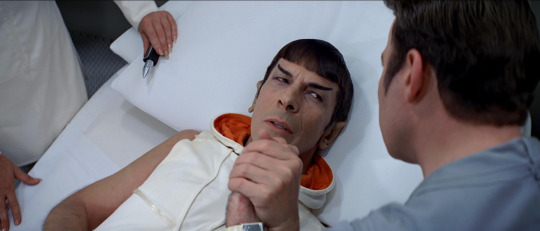
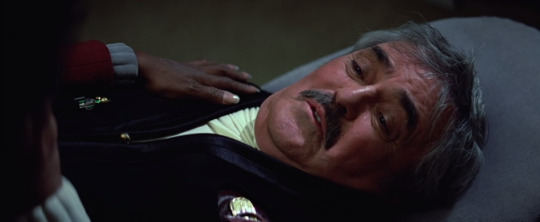
I repeat for the third and final time. It’s the same scene!!!
#yet Spirk is still more romantic#spirk#spirk is canon#space husbands#uhura x scotty#Captain Kirk#Spock#spock x kirk#Star Trek#Star Trek tos#star trek the motion picture#spirk endgame#lets ignore any reboots or remakes#this is real this is canon#no millennial self insert fan fic bs that revise history and changes the og show for no reason whatsoever
259 notes
·
View notes
Text
This April Fools, I thought it was only fitting that I finally share the greatest powerpoint I ever made while working a mentally and physically draining fulltime retail job at 18. This is my pride and joy. I hope you enjoy <3



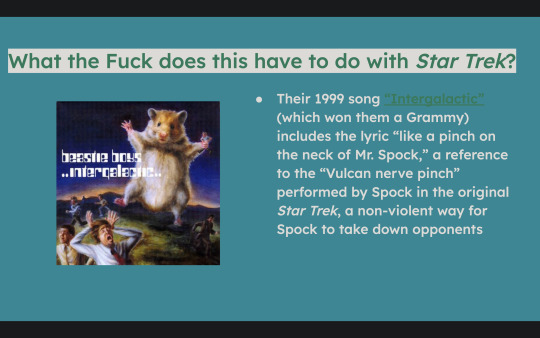




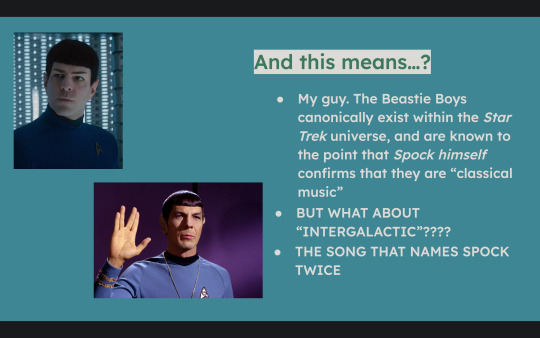

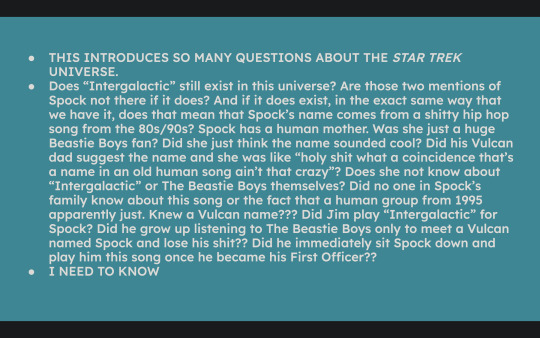
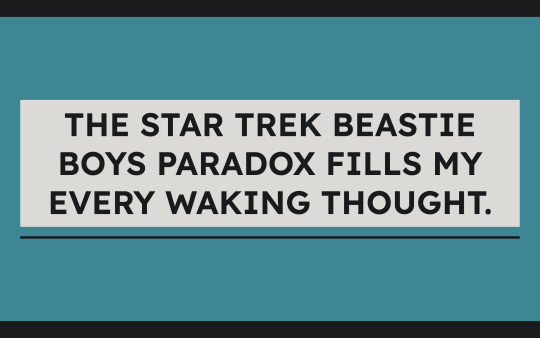
(the experience of reading this here will never live up to all of my fun little slide transitions but i included the blank slide to slightly allude to it)
#the star trek beastie boys paradox#also i apologize greatly for referring to intergalactic as a shitty hip hop song. 18 year old me was so rude for that#everytime i've presented this song to people it has been. the most chaotic thing ever#star trek#star trek alternate original series#star trek kelvin timeline#star trek reboot#star trek 2009#star trek beyond#star trek the original series#st tos#st aos#st kelvin#star trek tos#star trek aos#st#aos#tos#the beastie boys#intergalactic#spock#mr spock#schn tgai spock#jim kirk#captain kirk#aos spock#aos kirk#amanda grayson#sarek#schn tgai sarek
136 notes
·
View notes
Text
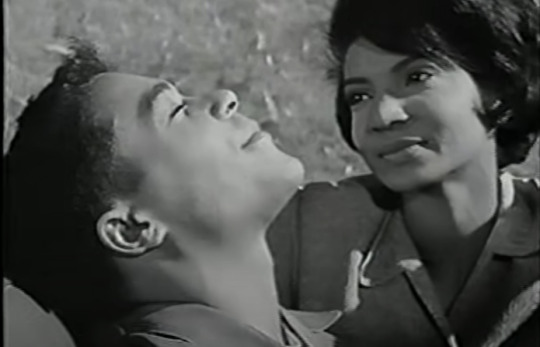
A COMPREHENSIVE & AUTHENTIC UHURA LOVE/HISTORY POST
The above is where Roddenberry 1st employed Nichelle Nichols [click to watch the full clip]. It was a military show based on Roddenberry's own experiences, the episode is called To Set it Right (I highly suggest reading the wiki article about it).
You should note two other actors, whom he later pegged for Star Trek are in the episode.
They dated briefly and then became good friends way before Trek came about.
Miss Nichols was already an accomplished singer and dancer who performed regularly w/ Billy Eckstine and Duke Ellington
Roddenberry's 1st show, The Lieutenant, was canceled/pulled from the air before these scenes bluntly dealing with racism could air (there's blackface as punishment for the racists at the end of the show, in a case of 'he 'a little confused but got the spirit' for the times, so tw)
He created Star Trek to try to soften the blow of all the social messaging he wanted to insert from his military experience. Star Trek was basically, a submarine drama placed in a sci-fi setting. He made it diverse on purpose because the military helped him travel and serve with all kinds of people. Roddenberry was inspired by that.
Uhura was the first person to read for Spock and in fact, helped to shape the character with her reading and based many of the traits of Uhura (formerly Uhuru) on Spock.
She was basically a glorified secretary. She played the part with poise, joy, and the 60's style womanism she got to play out for those times... Everything from her mini-skirt (which Nichelle herself called very comfortable) to her smile, and teasing lines, and quips were about her playing "big" in a small role. She made every moment, every look, every line, and movement count:

Roddenberry cracked jokes about the fact that the network never figured out that Uhura was fourth in command.
Nichelle was the only main cast member who was not salaried. She was paid by the hour. This attempt at marginalization actually resulted in her being the highest paid at times, because of the long hours.
Nichelle was not let in the front entrance at times, her fan-mail was kept from her, and she grew frustrated with the constant cutting of her scenes, lines and storylines. This is why she justifiably attempted to leave. The bigots in production did not like her being there (and if we're being real, were it not for Janice Rand's actress Grace Lee Whitney having gone through so much and thus losing her job in the 1st season...Uhura might have had even LESS presence)
The lost context in MLK convincing her to stay was that YES she was minimized and could make more money and be more fulfilled on broadway, but her symbolism and presence meant so much at a time when Black women weren't on TV unless as a racist caricature cleaning a house, and even that was rare...that she stayed.
One of her best allies was DeForest Kelly, who threatened to quit if they fired Nichelle. George Takei was her absolute best friend on the show and in life (she served as his Best Woman at his wedding).
There was an unfilmed episode in which Uhura and Deforest would have played reverse roles in "racial dynamics" on a planet they visit
Spock and Uhura were originally supposed to kiss in the alien mind control episode, but Shatner demanded to do so for the publiicity.
Her work to recruit marginalized people as astronauts, as in personally going to colleges and talking to candidates after the show is a staggering achievement that arguably is the most potent of any castmember in any of the Trek series post-show. Sally Ride, Guy Bluford (she personally recruited the 1st woman and 1st black astronaut), Mae Jemison (the 1st black woman credits her for inspiring her to become an astronaut).

Uhura did finally command the ship in the animated series. She would not have gotten to voice the role, but for Leonard Nimoy making it an obligation that all the original actors voice their parts for him to come on.
Scotty and Uhura in the film was definitely a pair the spares situation, in which both were the leftover senior citizens with the writers just going "why not?"
it was beyond insulting and she did protest about the scene where she's bumbling through a giant translation book to speak to klingons for laughs in trek 5 ...but her best moment IMO is her pulling a gun on the young ensign in the transporter room in Trek 3...sadly her ONLY scene in the damn movie.
Miss Saldana got to play to MANY corrections in JJ Abrams rebooted Trek, from being amazing at languages to having an actual life & love, to confidently turning down Kirk at every turn.
FUN FACT!! Both JJ and Bob Orci both expressed disappointed shock that the love story between Spock & Uhura got more hatred from fans than BLOWING UP PLANET VULCAN.
another FUN FACT!! The love story between Spock & Uhura is what grabbed the old school Star Wars fan (JJ Abrams) enough to come aboard to direct. Yep. JJ ships Spock & Uhura.
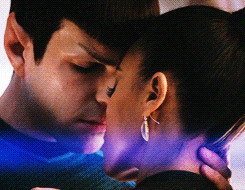
Zoe's iteration became the 1st version of Uhura to speak confidently in Klingon
Celia Rose Gooding becoming Uhura brings around a lot of Uhura's qualities full circle, IMO. As she is also from theatre (like Nichelle) and has a beautiful singing voice as well as the charm. Zoe's iteration was sharper, and much more protective, professional, & mature, about her life and love.
Celia Rose has the youthful curiousity and stars in her eyes and had vulnerability from her first intro... I loved the eagerness the crew showed to being in her orbit, seeing the glow of her talent and being drawn to that, to have a part in nurturing that.
As I've said... Celia IMO has the most dazzling smile, giant warm brown eyes, fantastic curves, and an energy that feels essentially Uhura, & that is all light, joy, a bit of uncertainty, -from the light singing (!) and the growth to her joy in discovery... I'd love to see her writing move away from serving and be more about her wants needs and growing in friendships/loves.
But Celia is a gift and is perfectly cast.
Essentially Uhura = femininity, graceful carriage, gorgeous smile, excellence in engineering and translation (canon!), ability to sing and play the Vulcan lyre, sharp womanist wit, love for her U.S. of African-Kenyan culture and being beloved by all crew...
When Miss Celia hummed those gorgeous notes to the alien entity on that comet?? That Solidified that she IS Uhura IMO.

I 100% think they fucked up by killing Hemmer, because that mentor-mentee relationship was giving marginalized coming together and bonding over everybody else's bullshit and I was here for it...it was giving me Data and Geordi updated...and since then, IMO they've lost track and given us the same kinda backwards wingwoman role BS, that people who like to pretend to be her fan shoehorn her into.
...but I have high hopes that they'll course-correct.
All this to say ALL OF THE ABOVE is Uhura and anyone calling her ugly, bossy, pushy, annoying, whatever is just sad little hater who doesn't know wtf they are talking about.
#uhura#celia rose gooding#zoe saldana#nichelle nichols#nyota uhura#star trek#star trek 2009#st: snw#star trek: strange new worlds#star trek strange new worlds#strange new worlds#meta#anti-misogynoir#see how easy it is to talk up Uhura w/o pretending the only reason she's allowed to be is to get two dudes together?#see how easy it is to post something about who she is beyond a photo and just claiming she's your fave?#Youtube#another tidbit is that my man karl urban who gave the most direct and authentic playing of his reiteration IMO...#IS a true trekkie who spoke up for canon moments Spock and Uhura share in TOS when they got questions about Spock/Uhura in the reboot#p.s. yall got scammed by the gofundme for nichelle#her son moved her to new mexico and sold her house out from under the grifter because he was squatting there#yall just gave that fanclub lady free money#fanclub lady was making her work and sign autographs through dementia for the grift too#note yall aint see where 70k went since her passing have you?#sadly
320 notes
·
View notes
Text

#star trek#spock#t'pring#spock and t'pring#s'chn t'gai spock#aos spock#star trek reboot#star trek fanart#spirk
2K notes
·
View notes
Text
making something your roman empire?? nah. i’m out here making things my romulan empire.
#for example#spirk is my romulan empire#not a day goes by#where i don’t think of them#star trek#star trek the original series#star trek tos#star trek movies#star trek alternate original series#star trek aos#star trek reboot#james t kirk#s’chn t’gai spock#spirk#k/s#jim x spock#americanbi’s posts
423 notes
·
View notes
Text

Khan Noonien Singh.
#Star Trek AOS#Star Trek#Khan Noonien Singh#Benedict Cumberbatch#Star Trek Khan#ST AOS#Star Trek Reboot#PummeArt#(I just decided to post it now before I go insane fgdfgdfs)#(Hopefully I won't see any major mistakes now...)
81 notes
·
View notes
Text
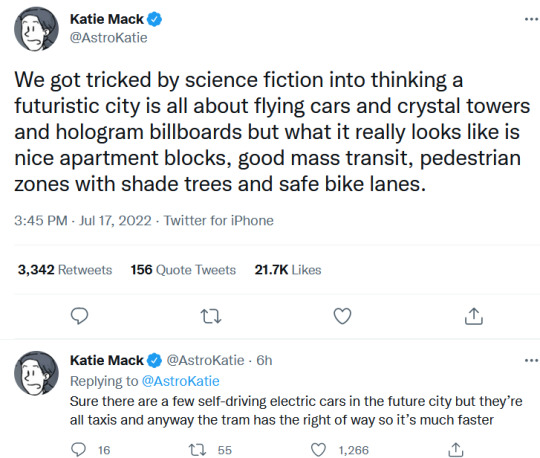
2K notes
·
View notes